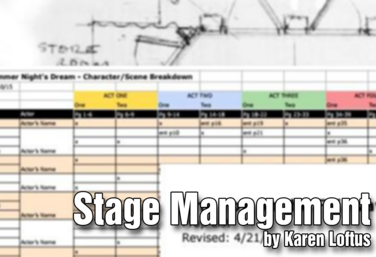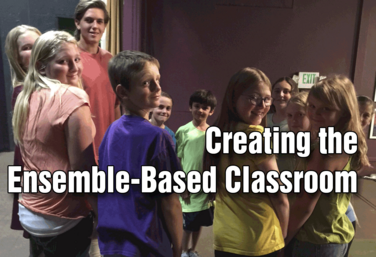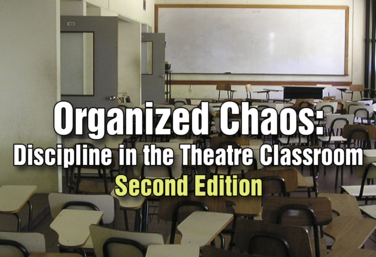California VAPA Standards (2019)
Adv.TH:Cn10 Synthesize and relate knowledge and personal experiences to make art.
View all Standards for California VAPA Standards (2019)
Adv.TH:Cn10 Collaborate on a drama/theatre work that examines a critical global issue using multiple personal, community, and cultural contexts.
Stage Management
by Karen Loftus
A unit on stage management is a great way to link technical theatre, acting, and even directing. We spend so much of our class time on performance-related projects and, when we do address technical theatre, we often do so by talking about design.
Why not introduce your students to a skill set that not only benefits your productions by ensuring a strong backstage crew and smooth production process, but also benefits the students individually? Through exploring stage management, students learn skills such as analytical thinking, organization, teamwork, and problem solving.
Read More...
Read Less...
Theatre Radically Reimagined: Exploring Artaud, Grotowski, and Boal
by Ruthie Tutterow
In this unit, students will learn about Antonin Artaud and how his ideas influenced avant-garde theatre in the 20th and 21st centuries. They will also learn how Jerzy Grotowski took Artaud’s theories into new directions. This is done through direct instruction. A culminating presentation will ask students to take common stories and reimagine them using some of these ideas. They will present a “pitch” of an avant-garde version of their story. In the second lesson, students learn about some of the ideas of Augusto Boal and try a session of Forum Theatre.
Read More...
Read Less...
Introduction to Stage Management Part One
by Karen Loftus
In this course, instructor Karen Loftus explores the responsibilities of a stage manager. You'll learn exercises that will help you demonstrate those responsibilities and the necessary skills of a stage manager to your students. You'll learn how to train your students to serve as stage managers for your school’s productions.
The course takes you through what a stage manager does prior to rehearsal and throughout the rehearsal and performance process to have a smooth-running backstage. It includes learning about the paperwork required, including prompt scripts, rehearsal preparations, notating blocking, and a stage manager’s kit and checklist to wrap it all together.
Read More...
Read Less...
Creating the Ensemble-Based Classroom
by Gai Jones
Gai Jones will help you establish an ensemble-based environment from the first day of class or rehearsal.
Learn how to set up your ensemble-based classroom from day one, get students to set classroom norms, and find the balance between creative activity and structure. You’ll learn how to give your students creative freedom through structure and classroom management. The cornerstone of this course are the detailed ensemble experiences from large group to small group and even individual experiences.
This course culminates in a devising model that you can use with your students, and takes you through process, product, performance and an evaluation.
You too can create the ensemble-based classroom.
Read More...
Read Less...
Introduction to Stage Management Part Two
by Karen Loftus
Karen Loftus instructs this second course in stage management - a companion to Introduction to Stage Management Part One.
This course will review the major concepts covered in Introduction to Stage Management, and discuss the different types of technical rehearsals and how student stage managers prepare for and run them. You’ll learn how to teach your students to notate and call cues for a show. The course will also introduce strategies for student stage managers who work with student crews. It will discuss how you can provide the support your student stage managers need to be effective, and how that support helps to strengthen your overall program and theatre community.
Student stage managers start in the classroom, train during school productions, and can take these newly discovered and acquired skills on with them to colleges and careers and theatre (and beyond)!
Read More...
Read Less...
21st Century Skills Through Devising
by Allison Williams
Allison Williams leads the course: 21st Century Skills Through Devising. This course covers what devising is, why to do it, how to do it, and how your students can master the 21st Century Skills of collaborations and cooperation, critical thinking, creative thinking through devising.
High school is a great place to try devising with your students. But it’s not something you want to throw at your students without any preparation. Framework is important and this course takes you through a number of exercises you can take into the classroom tomorrow to help build a place of physical safety, a place where students work at making a lot of choices instead of waiting for the perfect choice, and a place where students feel comfortable making creative choices. The material also reviews the process of putting together a show from the idea/research stage to editing, to giving feedback.
Your students have what it takes to create their own material, collaborate with each other, and have a unique theatrical experience!
Read More...
Read Less...
Rethink Pacing in the Drama Classroom
by Matt Webster
Pacing is one of the invisible hands of good teaching. Pacing is a fundamental component of a well run classroom. Many challenging issues that teachers face in the classroom stem from undiagnosed pacing issues: From comprehension to classroom management, pacing can be identified as both the source, and the solution of these problems. This course covers the Definition of Pacing, Non-Standardized curriculum, Pacing and Authentic learning, Expanding and Contracting The Pace, Transitions, Rehearsals and Hidden Pacing.
Read More...
Read Less...
Organized Chaos: 2nd Edition
by Matt Webster
Organized Chaos: Discipline in the Theatre Classroom will give you tools and strategies to prepare you for challenges you may face as you step up in front of a class of students and introduce them to the art of theatre.
Whether you are a student teacher finishing college, a first-year teacher just starting out in the classroom, or an established teacher with a few years of experience under your belt, these lessons will provide insight and support as you establish discipline in your classroom.
This is a revised, 2nd edition of a favourite original course in the DTA, brought to you by experienced theatre educator, Matt Webster.
Read More...
Read Less...
View all Standards for California VAPA Standards (2019) Standards Master List
© Copyright 2015-2025 Theatrefolk







